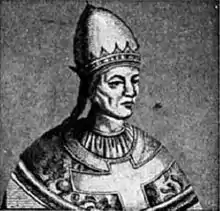
Pope Gregory VII (c. 1015/1020/1028 – May 25, 1085), born Hildebrand of Sovana (Italian: Ildebrando da Soana), was head of the Catholic Church and ruler of the Papal States from 22 April 1073 to his death in 1085. He is venerated as a saint in the Catholic Church.
One of the great reforming popes, he is perhaps best known for the part he played in the Investiture Controversy, his dispute with Emperor Henry IV that affirmed the primacy of papal authority and the new canon law governing the election of the pope by the College of Cardinals. He was also at the forefront of developments in the relationship between the emperor and the papacy during the years before he became pope. He was the first pope in several centuries to rigorously enforce the Western Church's ancient policy of celibacy for the clergy and also attacked the practice of simony.
Gregory VII excommunicated Henry IV three times. Consequently, Henry IV would appoint Antipope Clement III to oppose him in the political power struggles between the Catholic Church and his empire. Hailed as one of the greatest of the Roman pontiffs after his reforms proved successful, Gregory VII was, during his own reign, despised by some for his expansive use of papal powers.
Quotes
- That it has pleased God to make Holy Scripture obscure in certain places lest, if it were perfectly clear to all, it might be vulgarized and subjected to disrespect or be so misunderstood by people of limited intelligence as to lead them into error.
- In response to the request made in 1079 by Vratislaus, duke of Bohemia, seeking permission to use Slavonic in local church services.
- Awake! magazine December 2011, page 7; They Tried to Keep God’s Word From the Masses.
- Dilexi iustitiam et odi iniquitatem; propterea morior in exilio.
- I have loved righteousness and hated iniquity, and therefore I die in exile.
- Last words, as quoted in Joseph Priestley A General History of the Christian Church Vol. 1 (1802), p. 361.
Quotes about Pope Gregory VII
- As a mere constellation of talent in different fields Anselm, Gregory VII and William the Conqueror were the greatest men in Europe during this period... William and Gregory were men of action of a kind rare at any time, but almost unknown in the Middle Ages: they were creators who dealt intuitively with confused situations, having little in precedent or business routine or learned construction to guide them. Gregory had an energy of purpose and clarity of vision in practical affairs for which no parallel can be found in these centuries.
- R. W. Southern, Saint Anselm and His Biographer: A Study of Monastic Life and Thought 1059–c.1130 (1963), p. 4
- Religion, and it can merge into nationalism as orthodoxy does with the Serbs and the Russians, offers both a cause worth dying for and the promise of eternal life. The crusaders did not leave their homes all over Europe and make the long and dangerous journey to the Holy Land just to acquire loot and land. There was more and better to be had much closer to home. They were driven by what they thought was a divine mission, to retrieve the land where Christ had once lived for Christendom. Many crusaders – kings such as Richard I of England, the Lionheart, and Philip II of France and great landed magnates – left behind properties, position and families and many never returned. Egged on by religious leaders such as Pope Gregory VII, who reminded the faithful of the passage from the Book of Jeremiah ‘Cursed be he that keepeth back his sword from blood’, they killed indiscriminately those they thought of as infidels. In the massacres in Jerusalem in 1099 the streets were said to have run with blood, in some places up to the knees of the crusaders’ horses. ‘None of them were left alive; neither women nor children were spared,’ said a contemporary account.
- Margaret MacMillan, War: How Conflict Shapes Us, (2020)